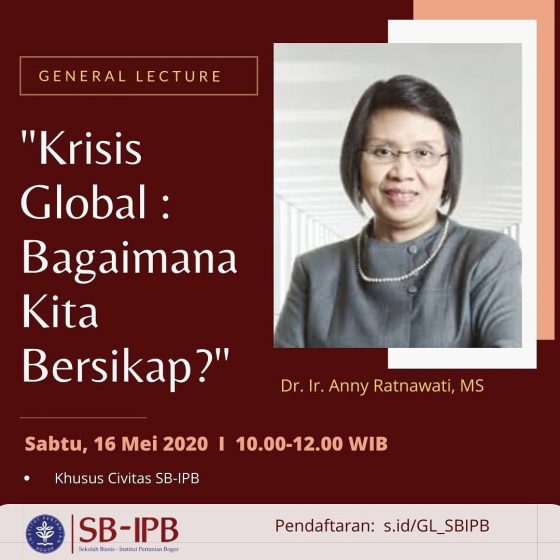
General Lecture “The Global Crisis: How Do We Act?” By ; Dr. Ir. Anny Ratnawati, MS
IPB Business School organizes general a special lecture for the SB-IPB community with speakers. Dr. Ir. Anny Ratnawati, MS (16/5). Sheis a lecturer at IPB Business School, at the same timepractitioners who had served as Representatives Minister of Finance. There were 132 participants following the general lecture on the theme “CrisisGlobal: How Do We Act? ”. Activities opened and moderated by Prof. Noer Azam Achsani as Dean of the SB IPB Business School at 10.00 WIB, followed by an explanation by the speaker. Data was shown at the beginning of the presentation world economy and growth predictions global economy 2020 will be tough enough. Dr. Ir. Anny Ratnawati also conveyed that the predicted numbers have never happened where almost all countries experience economic contraction simultaneously. On projectionIndonesia’s growth itself shows divergence amid the uncertainties predicted by various institutions.
Dr. Anny briefly discussed the crisis experienced by Indonesia in 1997-1998, 2011, and 2018 as material for reflection so that we can best respond to the current crisis. Further the data shows that economic activity in almost all countries especially in the service sector showed a sharp decline in March 2020. Data Volatility Index initially increased in January to March, began to declinein April which showed less volatility. Hopefully this is a relatively stable signal because in some countries, the effects of COVID-19 can be controlled. Other data shows that the increase in inflation in Indonesia is considered very low, amounting to 0.08 percent because generally if you enter the month of Ramadan and approach Eid al-Fitr, there will be relative inflationhigh.
Another interesting data is that Indonesia’s trade balance was surplus in March amounting to 743.4 million US Dollars. This surplus was caused by a faster decline in imports than export. It was also stated that monetary and fiscal policies need to be encouraged to improve consumption, investment, state spending, and to cover the possibility of insufficient net exportsin driving the economy. The 2020 APBN adjustments are one example of how fiscal expansion is carried out. Widening a deficit of more than 3 percent is due to decreasing state income, while state spending must improved in relation to emergency response. In this case the government has implemented a counter syclical policy.
Then how do we behave or respond to this COVID-19 crisis? So as not to fall too deep, hence food stability must be the key, including availability, distribution and price. Learning Furthermore, from the past crisis, political stability must be maintained, must ensure the group. The lower class has sufficient life and food needs, and maintains the middle class society don’t panic. In essence, as a good society, what needs to be done is to maintain body immunity, lifestyle, and follow the rules that are enforced. At the end of his presentation, he emphasized that a country must have three main resilience namely food, energy and water security.
The discussion and question and answer session was very interactive, various problems were discussed and discussed in the Virtual Room Zoom. At the beginning of the discussion, Bu Anny provoked him by saying one question “what to do with the demographic dividend that is starting to happen now with peak in 2050? ”. Followed by various questions from the participants regarding crisis 2020, demographic bonuses, local food, village funds, banking risk in times of crisis, assistance Direct Cash (BLT), to matters relating to export-import and resource utilization local power. At the end, was conveyed by Mrs. Anny, “Let us keep the spirit and believe that this crisis is ends soons and contains a goodness. With difficulties, there must be convenience, stay positive thinking






Recent Comments